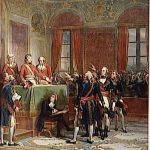Camilo Benso Cavour was born in 1810, a Piedmontese aristocrat whose name and mother language were French. It is interesting to note that both Cavour and Garibaldi (q.v.) spoke incorrect Italian. Trained in journalism, Cavour was editor of the newspaper Il Risorgimento by the time he was thirty-seven.
Il Risorgimento or ‘Resurrection’ was a movement designed to unite Italy. Austria was a formidable and intractable opponent of unification, because it dominated Venetia, Lombardy and most of the peninsula. Habsburgs ruled in Tuscany and Parma, and the Duke of Modena was also Austrian.
The policy of the newspaper with that name was to persuade Italian rulers to cooperate in the removal of Austria, with violence if needs be. But the revolution(s) of 1848, in which Cavour took no part, proved that kicking the Austrians out could not be achieved with foreign help.
In 1850 Cavour got into the Piedmontese government, and was Prime Minister by 1852. He stayed as PM until his death, except for a brief period of exclusion in 1859. Cavour hated Mazzini (q.v.), admired secularism and the free traders, opposed revolutions, and remained a monarchist; he could have been called a Conservative, were it not for the fact that he advocated reducing the power of the Church and orchestrated several commercial treaties with foreign powers. He also expanded the railways and began the process of turning Piedmont into a more progressive state.
So far so good; but then Cavour entered the Crimean War to please the King, though Piedmont got nothing out of this ridiculous war. Then Cavour signed an agreement with Napoleon III at Plombieres; the idea was that a successful war with the Austrians would be followed by Piedmont gaining Lombardy and Venetia. France would receive Nice and Savoy in return, from Piedmont. The eventual war only lasted two months, but the French thrashed Austria at Magenta and Solferino, though losses on both sides were appalling. Napoleon III suddenly made peace without bothering to conquer Venetia. Put not your trust in princes.
Only Lombardy was gained by Piedmont, and France gained nothing, as the agreement at Plombieres had not been fulfilled. Camillo Cavour resigned, very angry. In Central Italy the rulers of Tuscany, Parma and Modena ran away and were replaced by provincial governments, but then Cavour was told these new governments wanted Piedmont to annex them. Following his brief resignation (1859) Cavour resumed power and instantly signed another agreement with Napoleon III!
France thus acquired Nice and Savoy, while Piedmont doubled in size. Then Garibaldi intervened, much to Cavour’s fury, by invading first Sicily and then Naples. If Garibaldi marched on Rome, Cavour knew that his ally Napoleon III would defend Pope Pius IX. In desperation, Cavour decided to block Garibaldi by invading the Papal States beforehand! Unbelievably, this worked, especially when Great Britain announced she would back Piedmont and Cavour. Plebiscites were held in Sicily, Naples and the Papal States, all voting for annexation by Piedmont, to which, to the amazement of some, Garibaldi handed over his conquests. With the exception of Rome and Venetia, Cavour (with the help of Garibaldi) had united Italy.
Camilo Cavour became the first Prime Minister of a nearly unified Italy and promptly died in 1861. He was just fifty-one years old.











Leave A Comment